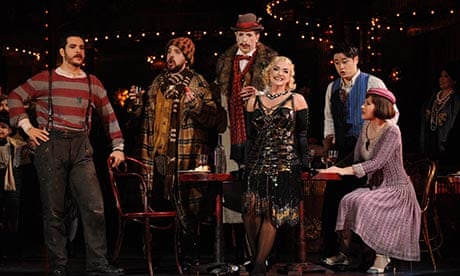As one of the best-loved operas in the repertoire, La Bohème was as sure-fire a way as possible of getting Opera Australia’s new season off to a crowd-pleasing start. As the well-heeled audience filed into their seats, they saw a plush red curtain embellished with a sign in which the title of Puccini’s imperishable opera was picked out in lights. It was the first sign of director Gale Edwards’ decision to set La Bohème in Weimar-era Berlin rather than 1830s Paris. Edwards says that she set out to expose the suffering caused by the Bohemians’ “careless existence” – that in being wrapped up in their own hopeless artistic enterprises, they ignore Mimì’s plight (poverty and tuberculosis) until it’s too late.
It’s a bold interpretation – if a somewhat strange target to take aim at given the rather larger evils abroad in the Weimar era. In practice, however, the theme doesn’t amount to much more than a few women in basques decorating the stage during the Café Momus scene, a checkpoint presided over by soldiers in jackboots in act three, and some mild camping around from Shane Lowrencev, playing Schaunard, in the Bohemians’ squalid flat. Edwards’s take is certainly far less radical than, say, Ken Russell’s notorious 1984 production of La Bohème, which saw Mimì dying of a heroin overdose and earned the threat of a lawsuit from Puccini’s grandson – or even Rent, which swaps Paris for Aids-crisis New York. Given that contemporary life is not exactly short of struggling journalists like Rodolfo, why not make him a blogger, or a down-on-his-luck music hack in Pete Doherty-era London?
Edwards’ attempt to excoriate the Bohemian lifestyle is also thwarted at every turn by the music, whose sumptuousness ultimately gives every squalid moment a tragic grandeur – just as Puccini intended. Happily, conductor Andrea Licata follows the composer’s instincts rather than the director’s, giving the opera a pace and fizz that avoids longeurs but allows the some of the most heart-aching setpieces in the whole of opera room to breathe. Some of the performances in the first half are slightly uneven – Ji-Min Park as Rodolfo doesn’t seem in total control of his big aria, Chi gelida manina (eternally known in the English-speaking world as Your tiny hand is frozen), and in the café scene he and Mimì (Nicole Car) seem more like lovestruck teenagers than passionate Bohemians.
By the time the red velvet curtain comes down again, however, their plight is as moving at is it convincing. Sharon Prero (an enjoyably brassy Musetta) and Giorgio Caoduro (Marcello) also give the leading pair a good run for their money, both vocally and charismatically. It’s a Bohème far less radical than its professed intentions, but perhaps the better – and more affecting – for that.

Comments (…)
Sign in or create your Guardian account to join the discussion